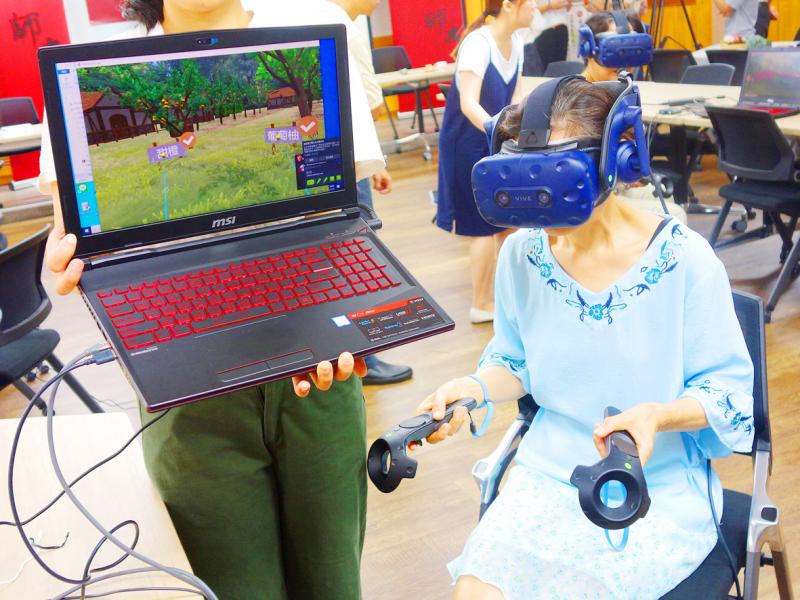National Taiwan Normal University (NTNU) has designed a virtual reality (VR) course combined with aromatherapy to increase the well-being of elderly people, with the research results published in an international medical journal.
NTNU College of Education vice dean Guo Jong-long (郭鐘隆) on Tuesday said that the college launched the course to reduce stress among elderly people, and help address some of the nursing difficulties faced by long-term care facilities, such as insomnia and dementia.
The course allows people to play a game in which they can smell natural scents, Guo said, adding that the scents help stabilize emotions and ease discomfort.

Photo: Wu Po-hsuan, Taipei Times
For example, players can experience picking oranges in an orchard or collecting resin from trees as the corresponding scents are released, he said.
Feedback from people who have participated in the course showed that as the game requires them to think, it can prevent dementia, while the immersive nature scenes made them want to experience the outdoors more, he said.
Some said that watering plants in the game gave them a sense of purpose and responsibility, while others said that they like learning how to use technology, as it helps them communicate better with younger people, the feedback showed.
The course and research findings have been published in the Journal of Medical Internet Research, Guo said.
PureAroma Healing Academy principal Cheng Ya-wen (鄭雅文), who collaborated with NTNU on the course, said that initially, scents were delivered manually.
For example, when a player plucked lavender, an assistant would put real lavender under the player’s nose, Cheng said.
However, the method created delays, she said.
The upgraded version, dubbed the “VR 2.0 course,” uses a scent diffuser containing seven fragrances in front of the player.
It delivers the scent automatically when the player performs an action to trigger it, she said.
Children who lack family interactions have also taken the course, Cheng said, adding that such children often lack opportunities to experience nature, and the course instills confidence and optimism in them.
The university said its development team has promoted the course to students at New Taipei Municipal Fuhe Junior High School and signed an industry-academia cooperation project with Shin Kong Wu Ho-Su Memorial Hospital in Taipei.
NTNU College of Education dean Chen Hsueh-chih (陳學志) said that the course is an example of the university taking its social responsibility seriously and how its achievements in academia and practical fields are helping construct a more harmonious society.

Alain Robert, known as the "French Spider-Man," praised Alex Honnold as exceptionally well-prepared after the US climber completed a free solo ascent of Taipei 101 yesterday. Robert said Honnold's ascent of the 508m-tall skyscraper in just more than one-and-a-half hours without using safety ropes or equipment was a remarkable achievement. "This is my life," he said in an interview conducted in French, adding that he liked the feeling of being "on the edge of danger." The 63-year-old Frenchman climbed Taipei 101 using ropes in December 2004, taking about four hours to reach the top. On a one-to-10 scale of difficulty, Robert said Taipei 101

Nipah virus infection is to be officially listed as a category 5 notifiable infectious disease in Taiwan in March, while clinical treatment guidelines are being formulated, the Centers for Disease Control (CDC) said yesterday. With Nipah infections being reported in other countries and considering its relatively high fatality rate, the centers on Jan. 16 announced that it would be listed as a notifiable infectious disease to bolster the nation’s systematic early warning system and increase public awareness, the CDC said. Bangladesh reported four fatal cases last year in separate districts, with three linked to raw date palm sap consumption, CDC Epidemic Intelligence

Two Taiwanese prosecutors were questioned by Chinese security personnel at their hotel during a trip to China’s Henan Province this month, the Mainland Affairs Council (MAC) said yesterday. The officers had personal information on the prosecutors, including “when they were assigned to their posts, their work locations and job titles,” MAC Deputy Minister and spokesman Liang Wen-chieh (梁文傑) said. On top of asking about their agencies and positions, the officers also questioned the prosecutors about the Cross-Strait Joint Crime-Fighting and Judicial Mutual Assistance Agreement, a pact that serves as the framework for Taiwan-China cooperation on combating crime and providing judicial assistance, Liang

US climber Alex Honnold left Taiwan this morning a day after completing a free-solo ascent of Taipei 101, a feat that drew cheers from onlookers and gained widespread international attention. Honnold yesterday scaled the 101-story skyscraper without a rope or safety harness. The climb — the highest urban free-solo ascent ever attempted — took just more than 90 minutes and was streamed live on Netflix. It was covered by major international news outlets including CNN, the New York Times, the Guardian and the Wall Street Journal. As Honnold prepared to leave Taiwan today, he attracted a crowd when he and his wife, Sanni,